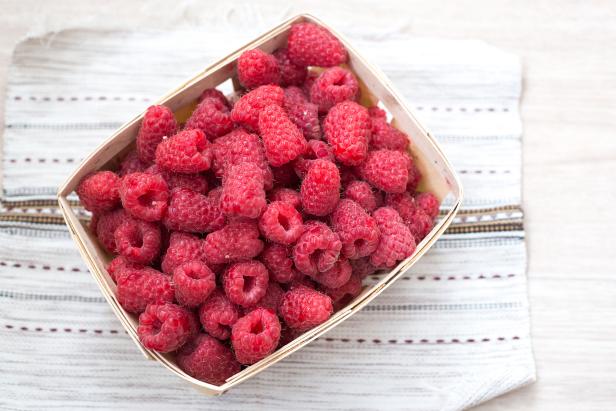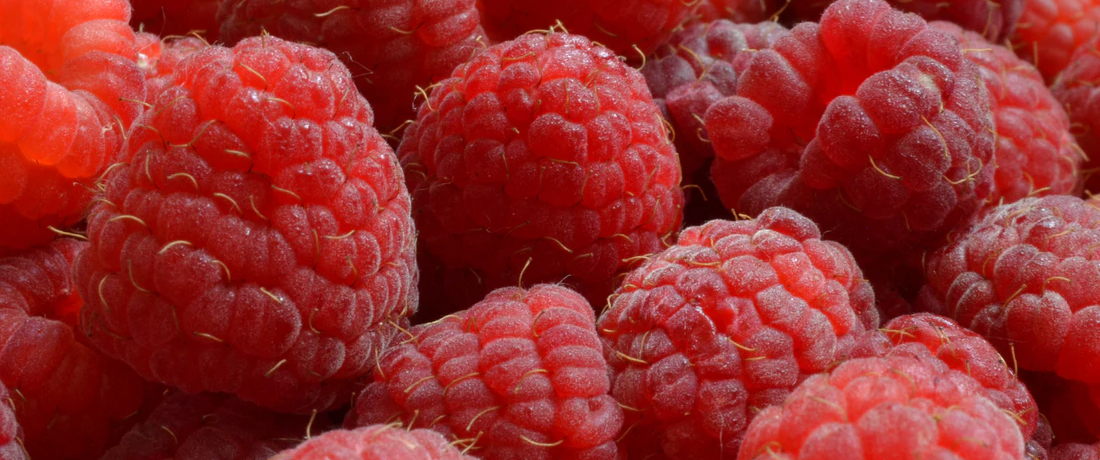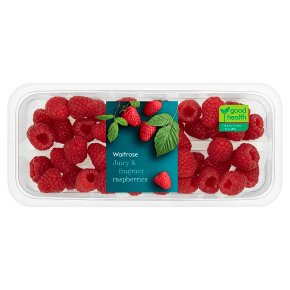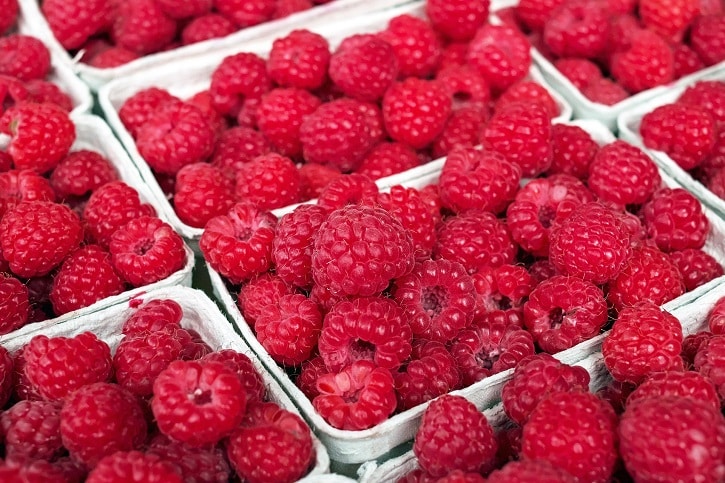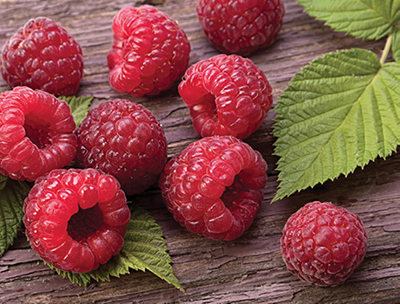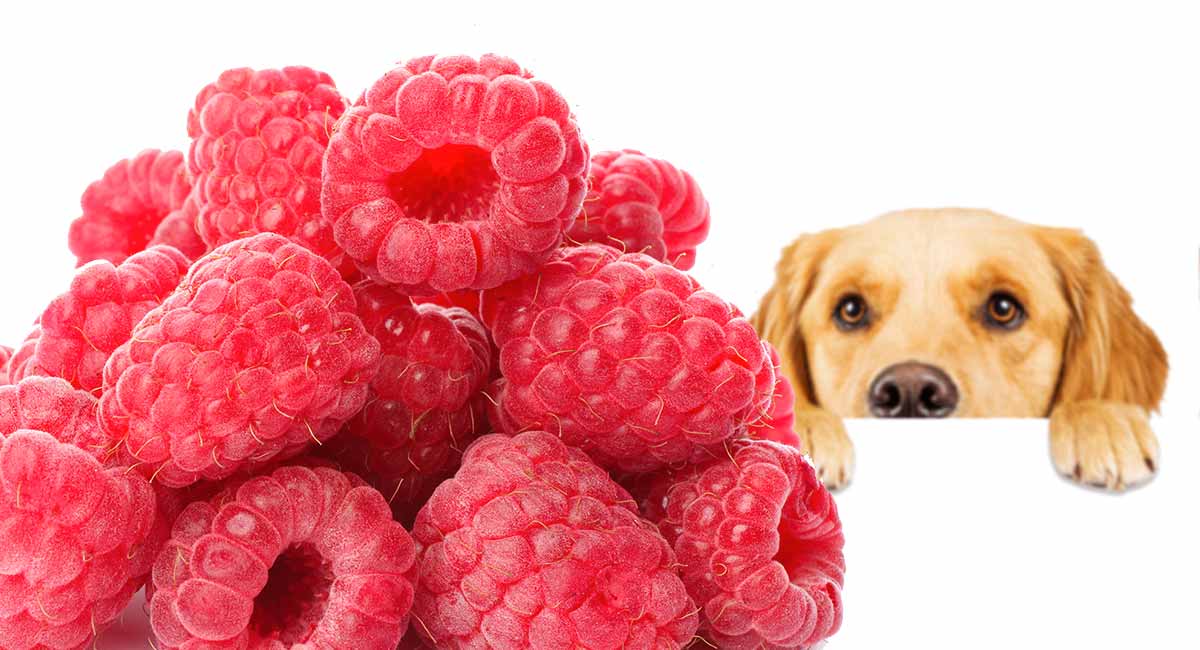Raspberries are juicy, sweet, and rich red fruit that belongs to the “Rose family” and is a summertime favorite. With many different species of raspberries, they are the norm and most popular. These raspberries are available as fresh fruit, puree, juice, quick-frozen fruit, and dried fruit. We have been eating these wild raspberries for thousands of years. They have so many health benefits.
But are raspberries good for your Tail-wagger?
Raspberries have health benefits for dogs also. They are rich in dietary fiber, antioxidants, vitamins, but low in calories. The only issue is the high levels of natural sweeteners and some sugar that can cause toxicity to the dog.
Raspberries are about 86% water, 12% carbohydrates, 1% protein, and 1% fat. 6% of raspberry is dietary fiber and has low calories to provide lots of fiber. Dogs do not need to eat any kind of fruits or berries as their diet content, but if your pooch enjoys raspberries and berries.
Can dogs eat raspberries?

Raspberries are the fruits that your pet dogs can safely enjoy in moderation.
Dogs can eat raspberries. Dogs are omnivores, and they love to eat a protein-rich food. Still, they can also get different benefits from fruits and vegetables as humans do. Fruits and veggies are low in sugar and fat, and high in vitamins and fiber.
Nutritional value of raspberries:
Raspberries are rich in nutritional contents with so many vitamins, fiber, and other beneficial contents:
- Raspberries contain a great variety of different vitamins and minerals, including Vitamin C, B-complex, K, and manganese.
- Raspberries also contain Xylitol that is harmful to dogs.
- With only 4% sugar in it, they are low in sugar that is a good option for your pup.
- This fruit has flavonoids also that are beneficial in reducing cardiovascular inflammation due to a disease.
- The raspberries in red color have so many antioxidants, including Vitamin C, gallic acid, and quercetin, that are important to fight against cancer and other diseases. Raspberries with different colors have a lower amount of antioxidants.
Are raspberries safe for dogs?

There are many types of berries. Fortunately, most berries, including these delicious raspberries, are safe for dogs to eat in moderation. These berries are used to eat with watermelon, apples, bananas, and more as both the dog’s favored and healthy fruits.
Fruits in your pup’s diet always come in a small amount that is not more than 5% of the overall diet. Secondly, professionals also suggest that professionals always feed the fruits and proteins separately to your dog because they cannot digest fruits well with proteins.
Fruits are not the absolute musts in a dog’s diet. They just play a role in his diet to potentially help your dog’s immune system and longevity.
NOTE: All the safe fruits, including raspberries, cannot be a major staple of your pet’s diet.
Benefits of raspberries for dog’s health:
There are many benefits for dogs associated with raspberries:
- The antioxidants present in raspberries help reduce the signs of aging and slow down the decline in aging dogs’ cognitive performance.
- These bursting antioxidants in raspberries may also help alleviate the mental decline in dogs associated with the aging process. These are also helpful in fighting against diabetes, cancer, arthritis, and heart diseases.
- The flavonoids present in raspberries are beneficial to reduce the risk and inflammation of cardiovascular diseases.
- Raspberries also contain Vitamin B-complex, C, and K with minerals like copper, folic acid, iron, manganese, and magnesium that are helpful for the better performance and overall health of your pooch. But the quantity of these components is low, so you cannot expect revolutionary results.
NOTE: There are some health benefits in raspberries for dogs, but it is far better to feed your dog’s quality dog food that is specially designed to fulfill your devoted friend’s nutritional needs.
Why are raspberries bad for dogs?

Raspberries have some benefits for dogs, but there are few essential aspects of raspberries that are important to know:
Xylitol in raspberries:
Xylitol is a sweetener that is very poisonous to your dog. This chemical can cause hypoglycemia and liver diseases in your dog that could be life-threatening to your pooch if left untreated.
Sugar in raspberries:
Plain old sugar is another substance present in raspberries that are bad for dogs. Raspberries contain a sugar called fructose with a slightly different structure from sucrose sugar (kitchen sugar). Fructose is OK for humans, and we can use it in our kitchen, but it is not suitable for dogs.
Your pup’s digestive system is designed to process protein and fats mainly, which is why it is difficult for dogs to digest fructose sugar. Luckily the sugar content present in raspberries is low. Having some fiber content also promotes digestion and helps to deal with obesity. It is good to serve raspberries to your dog instead of some man-made treats like cookies, sweets, or cakes.
Raspberries and other issues:
A small amount of raspberries is best to give to your dog. Otherwise, dogs, like people, may also become the victim of diabetes when allowed to eat a lot of sugar. Feeding your pooch with too many raspberries can also cause diarrhea, constipation, and vomiting.
Dogs are allergic to raspberries!
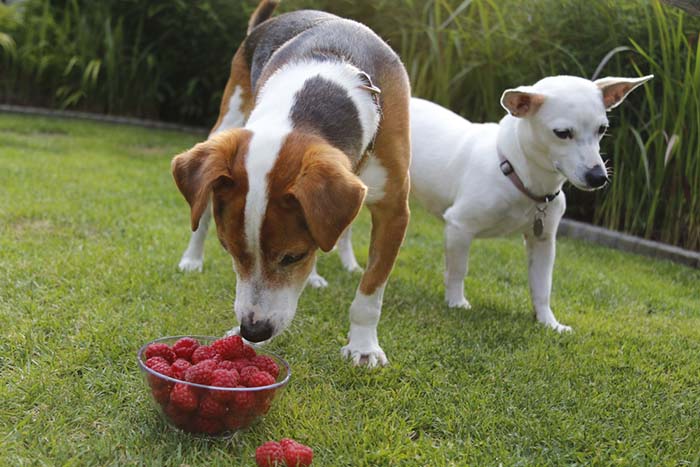
The digestive system of dogs is very sensitive, and it is hard to pin down the allergies in dogs. Ear infection and itchy skin are the symptoms that signal a possible food allergy in our furry friend.
Fortunately, there is no report of any widespread allergies in dogs due to raspberries. Still, you never know, so be careful and give raspberries to your pet dog in moderation. Your dog doesn’t like to dive in a large bowl of raspberries generally, but it could happen also.
In this situation, try to be on the safe side and contact your veterinarian for guidance and help.
Raspberries for puppies:
Your puppy needs your special attention while choosing their food, whether it is staples or treats. Your wise decision ensures proper nutrition for the rapid growth of your puppy.
Your puppy can eat raspberries occasionally, but not more than that. Even it cannot be used as a training treat for puppies. Puppies need lots of training, and you cannot serve them every time with this raspberries treat. Raspberries and other fruits are also not easy to store and carry everywhere because they become squishy and soft. It is best to rely on kibble or puppy food as training treats for your puppy.
You also have to keep in mind that puppies don’t need a “cognitive boost,” and smaller breeds of dogs are even more vulnerable to the potential harm from sugar and Xylitol.
Frozen raspberries for dogs:
On hot summer days, frozen fruit can be an excellent option for your pet dog. It is good to keep your dog hydrated and fresh. You just need to apply the same rule for frozen raspberries as it does for new ones.
“Give frozen raspberries to your dog in moderation.” It is good to make your frozen treats for dogs. Place fruit like a raspberry in an ice cube tray full of water and freeze it. You can also use some alternative raspberries for your dogs, such as pineapple, cranberries, and blackberries.
Canned raspberries for dogs:
Canned raspberries available in jars, jams, and spreads have a higher amount of sugar with added preservatives that are dangerous for dogs. Canned raspberries can be toxic for your dog, and you need to strictly avoid this sweet alternative to add to your pup’s diet.
Raspberry leaf tea for dogs:

This is a traditional herbal tea made of raspberry leaves that is related to pregnancy. It is also used for some dog breeds to help with whelping and female dogs. But it needs a lot of care to serve as it can cause a problem when used at the wrong time. It is good to talk to an experienced breeder.
How to give your dog raspberries?
Serving one or two raspberries every now and then probably does not hurt your dog.
Raspberries are entirely safe when given in moderation to your dog. Still, these contain traces of Xylitol that is harmful to dogs. Although raspberries contain a minimal amount of Xylitol and that is why you can serve your dog about 2-3 spoons of raspberries occasionally without any issue. You can give raspberries to your dog fresh and frozen.
NOTE: Don’t feed raspberries to your dog with protein because proteins need more time to digest than fruits.
Conclusion:
Yes! Your dog can enjoy raspberries safely.
Raspberries and most of the other berries are OK for your pooch when given in small quantities. Dogs are not designed to digest sugar and taking sugar in excess results in an upset stomach.
For a sugary treat for your dog, raspberries are relatively harmless and preferable to many other human foods. These are antioxidants present in raspberries that are beneficial for the brain progress of senior dogs.
